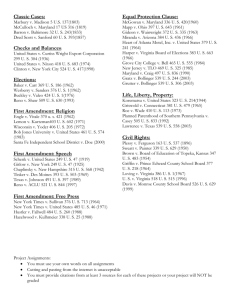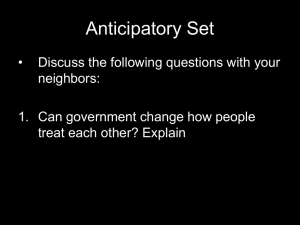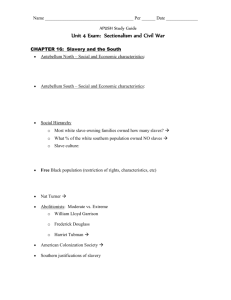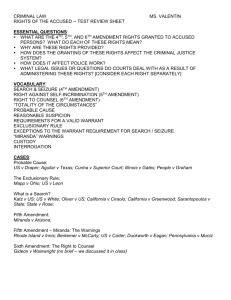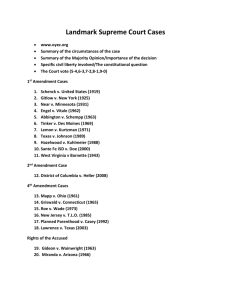Amendment IV
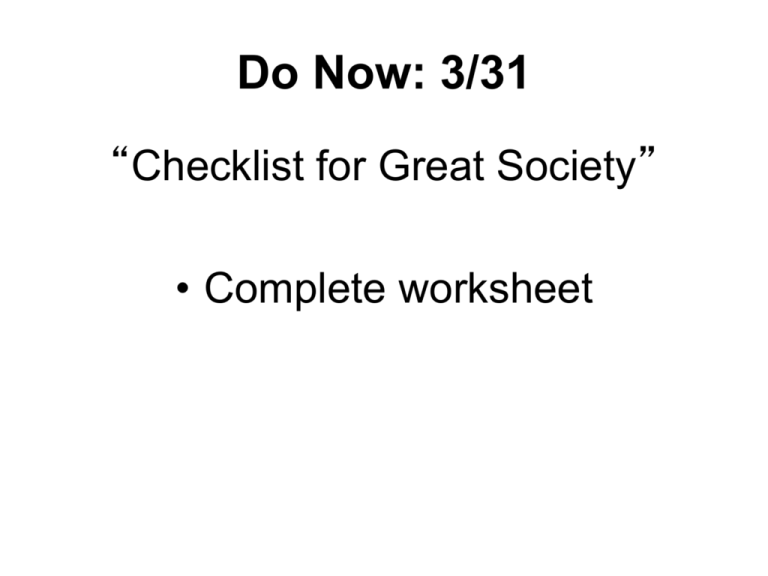
Do Now: 3/31
“Checklist for Great Society” • Complete worksheet
Lyndon B. Johnson
Election of 1964
Lyndon B. Johnson (LBJ)
• 4 th generation Texan • Taught debate and public speaking in Houston, Texas • Idolized FDR • State Director of National Youth Administration (New Deal) • 1937filled vacant seat in U.S. House of Reps • 1948- won Democratic party primary election for Senate by slim margin • Senate majority leader in 1955
1964 Election
• Republicans- Barry Goldwater – Arizona senator – Believed federal government had no business trying to right poverty, discrimination, and lack of opportunity – Attacked Social Security – Suggested use of nuclear weapons against N. Vietnam and Cuba
“In your heart, you know he’s right!”
• “In your head, you know he’s wrong!” • “In your guts, you know he’s nuts!”
1964 Election
• Democrats- Lyndon B. Johnson – most people were in tune with Johnson believing government should help solve nation’s problems – Used televised campaign commercials to win support – "Vote for President Johnson on November
3. The Stakes Are Too High for You to Stay at Home"
– Living Room Candidate: – http://livingroomcandidate.movingimage.us/el ection/index.php?nav_action=election&nav_s ubaction=D&campaign_id=168&ad_id =
Election of 1964
• Results – Johnson won in a landslide – 61% of popular vote – 486 electoral votes to 52 – Democrats increased their majority in Congress • Significance: – Johnson could launch reform program without interference from conservative Congress “GREAT SOCIETY”
The Great Society
Civil Rights Act of 1964
• July 1964 • prohibited discrimination based on race,
religion, national origin, and sex and granted the federal government new powers to enforce provisions
• power to use courts to desegregate schools and public places
Office of Economic Opportunity
• August 1964 • $800 million approved (1
st year) for youth programs, antipoverty measures, small business loans, job training
deficit spending
• Job Corps; VISTA (volunteers in Service
to America; Project Head Start; Community Action Program
Tax-Cut Bill of 1964
• Feb. 1964 • over $10 billion • spurred economic growth • people spent more
profits for business
increased tax revenues
lowered federal budget deficit
Elementary/Secondary Education Act Higher Education Act
• 1965 • $1 billion in federal aid to help public and
parochial schools purchase textbooks, special education, and new library materials
• Expanded federal assistance to colleges
and universities for buildings, programs, scholarships, and low-interest student loans
Medicaid/Medicare
• 1965 • Medicaid
provided medical care to those who could not afford it (welfare recipients)
• Medicare
provided hospital insurance and low cost medical insurance for almost every American age 65 +
– Paid for through Social Security taxes • Results- Physicians’ fees and hospital costs
soared
Immigration and Nationality Act of 1965
• 1965 • opened the door for many non-European
immigrants to settle in the U.S. by ending quotas based on nationality
• 290,000 people a year were to be
admitted on the basis of jobs skills and need for political asylum
• Placed limit of 120,000 immigrants/year
from countries in Western Hemisphere
National Housing Act of 1968
• Subsidized the private construction of 1.7
million units of low-income housing
• Real estate developers, investors, and
moderate-income families benefited the most
Water Quality Act Air Quality Act
• 1965 • required states to clean up rivers • search out chemical polluters • Imposes air pollution standards for motor
vehicles
• LBJ first president to send Congress a
special message on the environment
What rights do the accused have if they are suspected of committing a crime?
• Right to fair trial • Right to speedy trial • Right to not incriminate oneself • Right to a lawyer • Right against unreasonable searches and seizures
The Warren Court
Mapp v. Ohio 1961
• Case Background: • Dollree Map suspected by police of hiding a
suspect in a bombing- did not have a warrant
• As a result of their search of the basement, the
police found a trunk containing pornographic books, pictures, and photographs. They arrested Mapp and charged her with violating an Ohio law against the possession of obscene materials
• found guilty and sentenced to jail
appealed it was illegal search lawyer
Amendment IV
• The right of the people to be secure in their persons, houses, papers, and effects, against unreasonable searches and seizures, shall not be violated, and no warrants shall issue, but upon probable cause . . . and particularly describing the place to be searched, and the persons or things to be seized."
4
th
Amendment
• Translation • Protects people against unreasonable searches and seizures (search warrant)
Mapp v. Ohio 1961
• Result: • court ruled that evidence seized illegally
could not be used in state courts
• called the “
exclusionary rule
Abington School District v. Schempp (1963)
• Case Background: • State of Pennsylvania enacted laws that required the Bible be read at the opening of each public school day and that students could be excused upon written request of the parents.
• The Schempp family of Unitarian faith, filed a law suit claiming their 1 st amendment right was being violated • The father testified that he believed that excusing his children "from attendance at the exercises" would adversely affect his "children's relationships with their teachers and classmates."
Abington School District v. Schempp (1963)
• Result: • The Supreme Court held that the schools' Bible reading laws were unconstitutional
Baker v. Carr 1962
• Case Background: • addressed issue of reapportionment
way in which states redraw election districts based on the changing number of people in them
• 1960- 80% lived in suburbs/cities
changed congressional districts the never
• rural areas had more representation than
urban areas
• Tennessee did not reapportion in 60 years
Baker v. Carr 1962
• Result: • established principle “
One person, one vote!
” • federal court had the right to tell states to
reapportion their districts for more equal representation (based on census)
Gideon v. Wainwright 1963
• Case Background: • Charged with breaking into pool hall with
intent to rob it
• Request for attorney denied in Florida • deprived of due process under 6th
amendment
Amendment VI
• In all criminal prosecutions, the accused shall enjoy the right to a speedy and public trial, by an impartial jury of the State and district wherein the crime shall have been committed, which district shall have been previously ascertained by law, and to be informed of the nature and cause of the accusation; to be confronted with the witnesses against him; to have compulsory process for obtaining witnesses in his favor, and to have the Assistance of Counsel for his defense.
6
th
Amendment
• Translation You have a right to an attorney
Amendment XIV
• Section 1. All persons born or naturalized in the United States, and subject to the jurisdiction thereof, are citizens of the United States and of the State wherein they reside. No State shall make or enforce any law, which shall abridge the privileges or immunities of citizens of the United States; nor shall any State deprive any person of life, liberty, or property, without due process of law; nor deny to any person within its jurisdiction the equal protection of the laws.
14
th
Amendment
• Translation The Bill of Rights has to be upheld in the states
Gideon v. Wainwright 1963
• Result: • justices required criminal courts to provide
free legal counsel to those who could not afford it
Escobedo v. Illinois 1964
• Case Background: • Suspect brought in for the murder of
brother-in-law
• during questioning he incriminated
himself
convicted of murder
Escobedo v. Illinois 1964
• Result: • accused person has a right to have a
lawyer present during police questioning
Miranda v. Arizona 1966
• Case Background: • Ernesto Miranda was arrested at his home
in Phoenix, Arizona, on charges of kidnapping and rape
• After two hours of questioning by police,
he signed a confession and was convicted
• Miranda appealed claiming that he
confession was invalid b/c he was coerced and never read his rights
Amendment V
• “
No person…shall be compelled in any criminal case to be a witness against himself, nor be deprived of life, liberty, or property, without due process of the law.
”
5
th
Amendment
• Translation You have the right to remain silent
Miranda v. Arizona 1966
• Result: • Ruled that all suspects must be read their rights
before questioning
• Miranda warning • You have the right to remain silent. Anything
you say can and will be used against you in a court of law. You have the right to an attorney present during questioning. If you cannot afford an attorney, one will be appointed for you. Do you understand these rights?
Loving v. Virginia (1967)
• Case background: • In 1958, two residents of Virginia, Mildred Jeter, a black woman, and Richard Loving, a white man, were married in the District of Columbia. The Lovings returned to Virginia shortly thereafter. The couple was then charged with violating the state's antimiscegenation statute, which banned inter-racial marriages. The Lovings were found guilty and sentenced to a year in jail (the trial judge agreed to suspend the sentence if the Lovings would leave Virginia and not return for 25 years).
• Did Virginia's antimiscegenation law violate the Equal Protection Clause of the Fourteenth Amendment?
Loving v. Virginia (1967)
• Result: • Yes. In a unanimous decision, the Court held that distinctions drawn according to race were generally "odious to a free people" and were subject to "the most rigid scrutiny" under the Equal Protection Clause. • "Under our Constitution," wrote Chief Justice Earl Warren, "the freedom to marry, or not marry, a person of another race resides with the individual, and cannot be infringed by the State.” • Cited by gay men and lesbians seeking the right to marry
Closure:
• What is the most important legacy of the Great Society and Warren Court?
• Why?
• Do you have any further questions/points of confusion?
